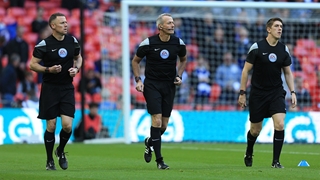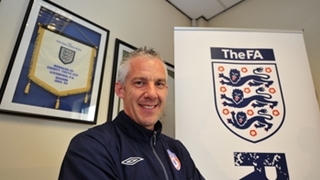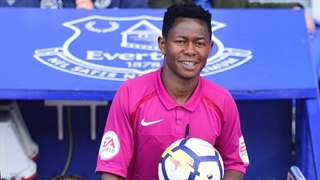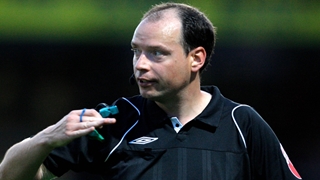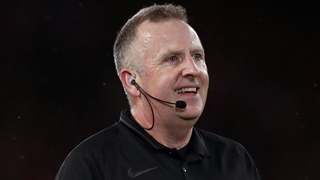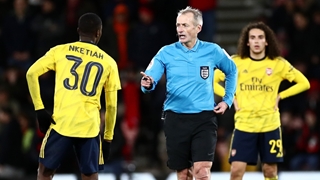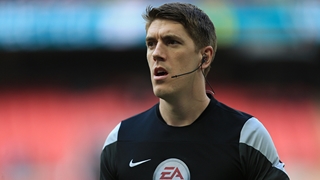
Congratulations on your appointment for the FA Cup semi-finals…a big occasion at Wembley and one to look forward to…
Every game at Wembley, regardless of what’s at stake, is always a decent opportunity to be a part of a big occasion so I’m looking forward to working with some colleagues I know really well in Mike Dean, Richard West, Andy Madley and the rest of the team. It’s two big teams and hopefully the ball rolls kindly for us all.
After the last few months, we’re all just grateful to have football back, but how has it been for you from an officials’ point of view?
It’s been a strange time, like for everyone else. I’ve been queuing at the shops for groceries for four households, walking the dog quite a bit and doing a bit of gardening and redecorating. In terms of refereeing activities, I managed to convert the garage into a bit of a gym so was able to keep on top of fitness and dive into some of the things the sports science team had pointed out for me, because there’s always room for improvement. We’ve also been able to stay in touch with our networks through the FA, PGMOL and UEFA so I was able to keep my mind ticking over and we’ve also had plenty of Zoom interactions with the other officials to keep in touch that way. One of the lads set up a group quiz for us as a refereeing group, so once a week we were all able to down tools and have a football knowledge quiz, a bit of a laugh and share some stories too.
How did you first get into refereeing?
It was actually through my Duke of Edinburgh Award when I was at college. I was still playing football to a reasonable level in a semi-professional set up and at the time I had no intention to become a referee even though my dad had been a referee too. My first desire was to play, and it wasn’t until two years after I’d done the course that I started refereeing when my das asked me to give it a go. It was when I was at Uni and initially to get a bit of spare cash to start with, because I was 18 and there were no teams at U18 or U19 level and I wasn’t ready to go into adult organised football at that stage. So I did a few kids’ leagues and just got the bug for it that way.
Where did you take your first course and then where did you officiate your first game?
My first course was at a local community centre in Liverpool, in a little side room. There was a dance class going on in the main hall and there was about 10-15 of us in this little room and I remember the tutor recognising my name because of my dad. Two years later, when I finally put a referee’s kit on and got out there, it was a local tournament organised by the Liverpool CFA and Knowsley Council with teams invited from across the world. I was a bit unsure on what to expect, even though I’d played in the same tournament a few years earlier. But it wasn’t until after day two that I really caught the bug after I refereed a decent game at U16 level between two good teams. I enjoyed doing that game and it went from there.
Is there one moment, good or bad, from your early experiences of officiating that springs to mind and has stayed with you ever since?
I’ve had many good and bad, but from my early stages, the main thing I remember is what my dad said to me before my first game, which is to ‘run around with a smile on my face and stay 10-15 metres away from the ball…’ I was knackered at the end of the game, because trying to keep 15 metres away from the ball is hard work, but I did run around with a smile and the players seemed to respond positively to that. And I felt I was able to talk to players because I had a background knowledge of the game from playing myself. At the end of the game, the Liverpool CFA referee development manager Dave Horlick came up to me with a chap who I thought I recognised, and he then introduced himself to me as Chris Foy, who was a Premier League referee at the time. We chatted for five minutes and he gave me a few pointers and they both contributed positively and made an impact on my refereeing career. That’s where the bug really started and since that day, they’re two people that I speak to regularly for advice and ideas. That’s the good experience I’ve had through refereeing.
What are the main benefits or enjoyments that you take from officiating?
Other than going to fantastic stadiums and officiating some great players on the pitch, looking at selfishly, it’ll be the places it’s taken me and the people that I’ve met. I’m fortunate enough to now be on the FIFA list and that’s taken me to places I’d never have thought possible previously. It’s allowed me to experience different cultures and share them with the referees that you go with who also become your friends. It does add value to your experiences to pass down to others, which I always try to do.
Do you have specific ambitions to reach a certain level in the game?
I’m fortunate to have done major FA Cup Finals already, and it was always an ambition of mine to do those big games. But the current one now is to keep operating at the level I am and be consistent on the domestic scene. My international goal is to go to a major tournament, if I’m lucky enough to get that chance. Hopefully if I can do well domestically, that will come and that is the aim.
Have you ever had a role model who you looked up to, or someone who has played a part in your success as an official?
My dad has played a massive part in my refereeing success, he watches every game I officiate in and provides both positive and negative feedback in the car home after games, when I’ve had a few tongue-lashings from him. It’s great to have that though, to just sit down and have a chat about football over a beer. It was always a dream to take my dad to Wembley and after the 2013 FA Vase it was even more special as I was able to give him a hug on the walk up the steps. That was a surreal moment. And also my brother, Edward, who played professionally for Everton until he was released at U21 age group and went on to have a fantastic career in semi-pro football with the likes of Altrincham, Marine, Chorley and Northwich Victoria. He gave me an understanding of how the game is played and how players react in certain situations to refereeing decisions. So it’s good to pick his brains really, and he’s someone that I still have discussion with about talking points of games, like having my own ‘Ref Watch’ really.
What would be your advice to anyone who is thinking of starting out?
The same that I got off my dad…run around with a smile on your face as players respond to that in a positive way and if you’re enjoying it, that’s half the battle. Bad times do come, but use those good experiences to navigate your way around it. I still do that now, and it works for me. And try to stay 10-15 metres away from the ball!
Talk us through your last game… What happened? What was the score?
It was last night, Newcastle United v Spurs and a 3-1 win for Spurs. It wasn’t the most challenging game in terms of end-to-end football and all action, but it needed to be managed to make sure things didn’t over escalate as there were small battles going on all over the pitch. Personally, I indicated one offside and a couple of flags that have allowed play to develop but the thing that stood out for me was the disciplinary action on Toby Alderweireld for a reckless challenge on Matt Ritchie. I was able to recognise the challenge and advise David Coote with the information that led to a caution.
INSPIRED? START YOUR REFEREEING CAREER NOW!

